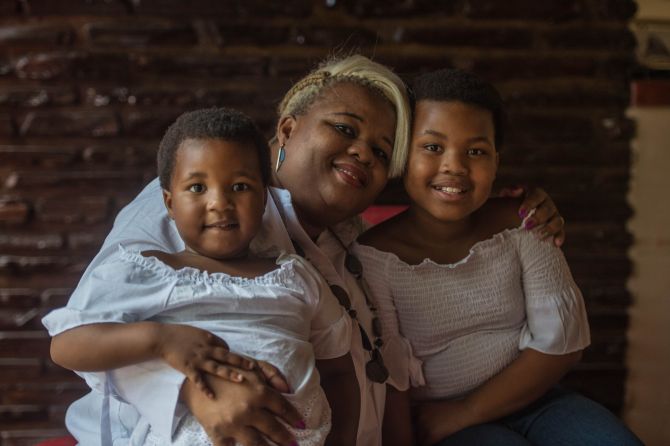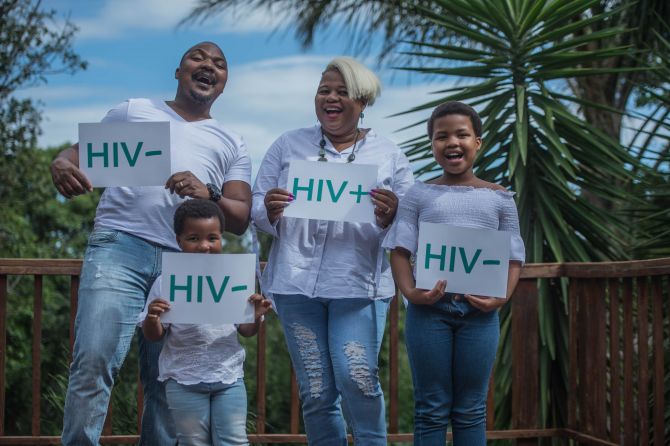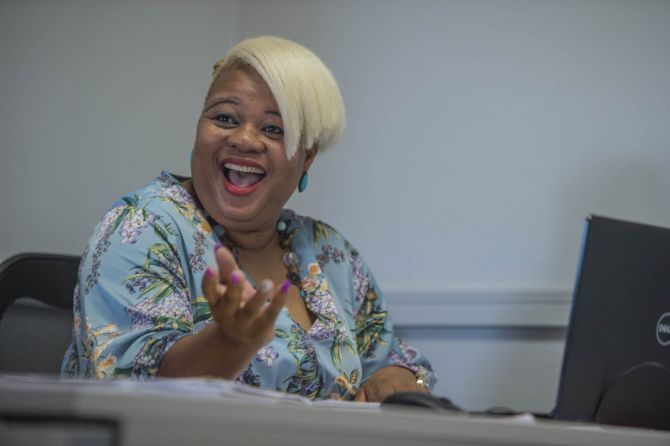



Feature Story
There is life after HIV, there is love
08 March 2019
08 March 2019 08 March 2019Mandisa Dukashe was nervous before she took an HIV test in 2002. As a nursing student in South Africa, where more than 4 million people were living with HIV at the time, she knew it was possible that she would test positive for the virus. “I was very stressed,” she says. “I kept postponing the test.”
Ms Dukashe had learned about HIV during her university studies, so the staff at the clinic assumed that she was well informed and didn’t need pretest counselling. “They told me I am a nursing student and should know what it entails.”
The test result was positive. Ms Dukashe joined 510 000 other South Africans who became newly infected with HIV in 2002—20% of all new infections worldwide.
When Ms Dukashe was diagnosed with HIV, South Africa had only recently started to roll out treatment and it was five years before she got access to it. It was harder to come by then, with limited medicine formulations that were only prescribed for people falling ill with an AIDS-related illness.
In 2002, South Africa had more than 4 million people living with HIV but fewer than 15 000 people receiving treatment through public facilities. That year the country also recorded more than 190 000 AIDS-related deaths.
The picture today is much improved.
Ms Dukashe and her family featured on the cover of the 2018 UNAIDS World AIDS Day report, Knowledge is power, as living proof that sustained HIV treatment can suppress a person’s viral load and prevent the transmission of HIV to a partner and children. “This can be done by anyone,” she says.
In 2017, there were more than 4.3 million people on HIV treatment and 110 000 AIDS-related deaths in South Africa. Yet there are still miles to go to end the AIDS epidemic by 2030. South Africa continues to rapidly scale up HIV treatment and is determined to reduce annual AIDS-related deaths to 80 000 or fewer by 2020.
Ms Dukashe says it didn’t take long to reconcile herself to her HIV-positive status. She was determined to embrace her status, look after herself and spread the word. She wanted to warn other young people to avoid HIV infection, take a test and seek support if they tested HIV-positive. “After the counselling, I felt so bold and confident and I was ready within a week to go out and tell the world with an intention of raising awareness, in particular among young women and adolescent girls.”
“At first I didn’t want to reveal my HIV status because I knew that it could be an issue, so I focused on my nursing studies. Eventually I fell in love with a guy and I feared he would reject me, but I had to tell him—I cannot live a lie."
But things were not always easy for her. Ms Dukashe was married when she was diagnosed. “Some people say that HIV can bring you closer, but that wasn’t to be.” They eventually divorced and it took time before Ms Dukashe found love again. “At first, I didn’t want to reveal my HIV status because I knew that it could be an issue, so I focused on my nursing studies. Eventually I fell in love with a guy and I feared he would reject me, but I had to tell him—I cannot live a lie. It took me three months to disclose my status, but to my surprise his response was much better than I hoped. He remains HIV-negative and he is the best husband and father of my children that I could ever ask for. When you have got that kind of support you can live healthily and even forget about HIV.”
Despite the love and support of her husband and family, the weight of living with HIV came flooding back to Ms Dukashe when she and her husband started planning to have children. “When the time came for us to talk about preventing HIV transmission to our children, we needed to think carefully, plan and consult medical experts. That brought it all back for me and I got depressed for a while.”
But help was available, she says. “I got counselling and worked through those feelings and it was all worth it. I now have two wonderful children who were born without HIV. It was my responsibility and also my husband’s responsibility. We got great support and advice.
“Being able to give birth to HIV-negative children was a blessing because I believe if I did not test, my kids could have been born with HIV.”
Ending new HIV infections among children is a high priority for South Africa, with a target of virtual elimination by 2020. Yet despite many years of concentrated effort, 13 000 children acquired HIV from their mothers in 2017. “It pains me that I could not breast-feed my babies,” says Ms Dukashe. “Because I wanted so hard to prevent them from getting HIV I fed them with formula milk, which made me sad.”
Thanks to improved treatment options, women living with HIV are now encouraged to take HIV treatment for their own health and to avoid their children becoming infected during pregnancy, birth or breastfeeding. All breastfeeding women in South Africa living with HIV and on HIV treatment are encouraged to exclusively breastfeed until their baby is at least six months old.
Ms Dukashe is now working as a project manager for point-of-care HIV testing and quality assurance. She is also a motivational speaker, creating demand for HIV testing and treatment, including among women of child-bearing age and their partners.
“Being able to give birth to HIV-negative children was a blessing because I believe if I did not test, my kids could have been born with HIV.”
“I want to encourage everybody in our situation: there is life after HIV, there is love. People should not think twice about going for an HIV test. It was the best decision I ever made, since I learned what to do to keep myself healthy and prevent transmission to my spouse and children. Thinking twice is not going to change the result.”
“As a healthcare professional, it is important for me to show that I am living positively with HIV and managing it successfully. My experience should encourage others to protect themselves and get tested regularly. If you test positive for HIV, start treatment and get counselling and support so you can keep yourself healthy and protect others. HIV is, unfortunately, a reality for millions of people, but treatment works and we are stronger than HIV.”
Finally, Ms Dukashe has a message for young women: “HIV is invisible. Always use a condom and be wary of older men. Age-disparate relationships are a risk. If you rely on an older partner and try to please them, you won’t be able to insist on using a condom,” she said. “I speak from experience, as someone who faced the same pressures.”
Region/country
Related
 Multisectoral resilience to funding cuts in Guatemala
Multisectoral resilience to funding cuts in Guatemala

22 December 2025


